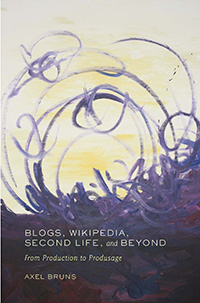Happy new year, everyone - I'm glad we've made it. In this first post for 2008, I'm delighted to announce the launch of a new Website to accompany my forthcoming book and track further research: Produsage.org will be a central space for anything that relates to the concept of produsage - for now, I've already posted up some introductory definitions and background information about produsage, excerpted from the book, a few articles about the concept, and some more details about Blogs, Wikipedia, Second Life, and Beyond: From Production to Produsage itself. This doesn't mean I'll discontinue this site, of course - but Produsage.org is now the key site for all produsage information, and I'll cross-post material here as appropriate.

 As we get closer to the release date for my upcoming book [weblink:475], I'm now starting to deal with the tail end of the production process - finalising the cover image and organising the back cover text.
As we get closer to the release date for my upcoming book [weblink:475], I'm now starting to deal with the tail end of the production process - finalising the cover image and organising the back cover text. 











